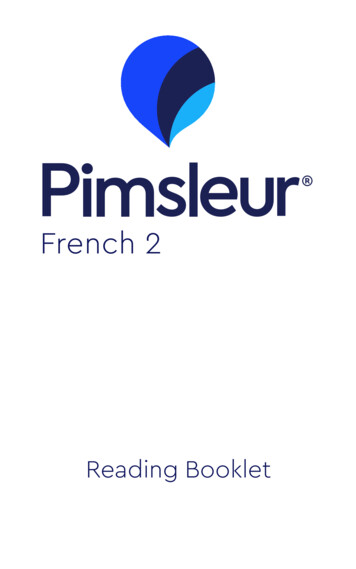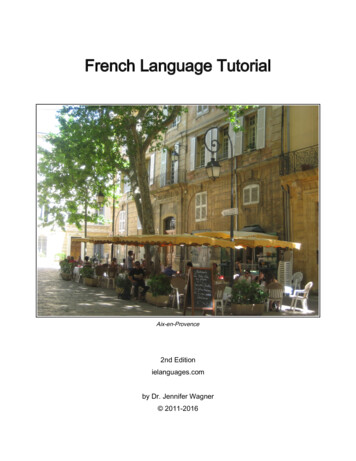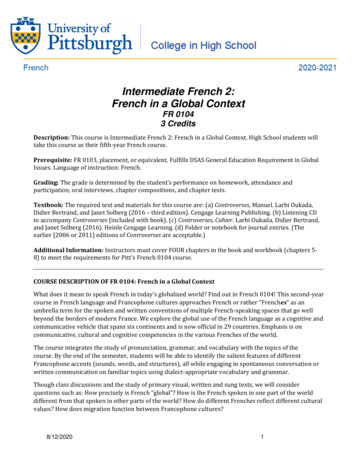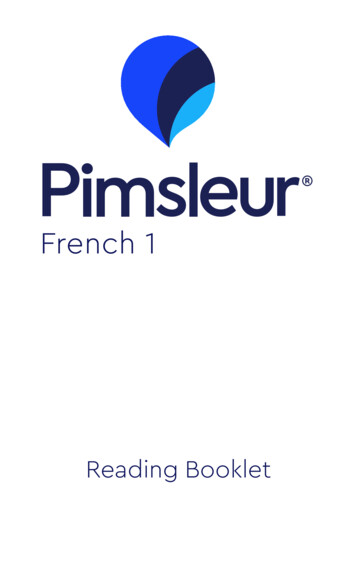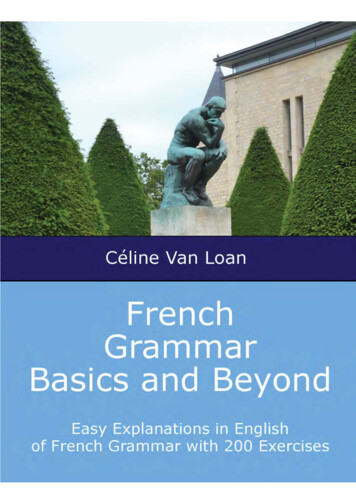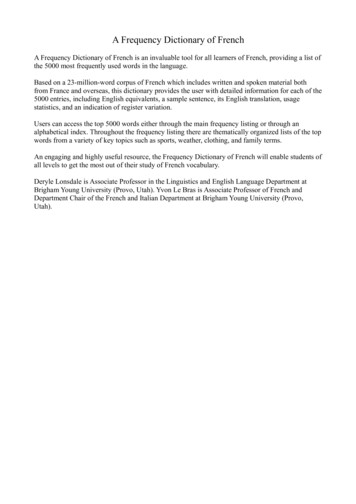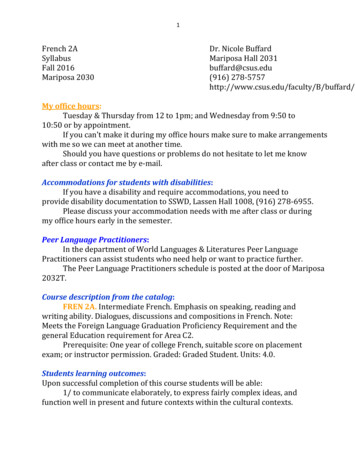
Transcription
1French 2ASyllabusFall 2016Mariposa 2030Dr. Nicole BuffardMariposa Hall 2031buffard@csus.edu(916) 278-5757http://www.csus.edu/faculty/B/buffard/My office hours:Tuesday & Thursday from 12 to 1pm; and Wednesday from 9:50 to10:50 or by appointment.If you can't make it during my office hours make sure to make arrangementswith me so we can meet at another time.Should you have questions or problems do not hesitate to let me knowafter class or contact me by e-mail.Accommodations for students with disabilities:If you have a disability and require accommodations, you need toprovide disability documentation to SSWD, Lassen Hall 1008, (916) 278-6955.Please discuss your accommodation needs with me after class or duringmy office hours early in the semester.Peer Language Practitioners:In the department of World Languages & Literatures Peer LanguagePractitioners can assist students who need help or want to practice further.The Peer Language Practitioners schedule is posted at the door of Mariposa2032T.Course description from the catalog:FREN 2A. Intermediate French. Emphasis on speaking, reading andwriting ability. Dialogues, discussions and compositions in French. Note:Meets the Foreign Language Graduation Proficiency Requirement and thegeneral Education requirement for Area C2.Prerequisite: One year of college French, suitable score on placementexam; or instructor permission. Graded: Graded Student. Units: 4.0.Students learning outcomes:Upon successful completion of this course students will be able:1/ to communicate elaborately, to express fairly complex ideas, andfunction well in present and future contexts within the cultural contexts.
22/ to create and respond elaborately using the language in culturallyappropriate ways.3/ to think critically by manipulating fairly complex even advancedstructures of the language to develop meaning in listening, speaking, readingand writing within the cultural contexts.4/ to understand well the Francophone cultures through the culturalcontexts of the language that form the basis of their study, internet searches inthe language and exploration of the perspectives, products, and practices ofthe cultures.Students Learning Outcomes for Area C2:The learning objectives associated with C2 should focus on the human condition.Specifically, students completing C2 requirements should be able to:A. Demonstrate knowledge of the conventions and methods of the study of thehumanities.B. Investigate, describe, and analyze the roles and effects of human cultureand understanding in the development of human societies.C. Compare and analyze various conceptions of humankind.D. Demonstrate knowledge and understanding of the historical developmentof cultures and civilizations, including their animating ideas and values.Course description:French 2A corresponds to 3 plus semesters of high school French. Asecond year Intermediate French course, it is a continuation of French 1B thesecond semester French course.Students need to have completed 1B or passed a competency exam ofequivalent level in order to be able to register in French 2A.As an Intermediate course, this class continues to develop and reinforcethe linguistic skills acquired in previous classes or during previous linguisticexperiences. With a strong emphasis on the spoken language, we will concentrateour efforts on the four language learning skills - speaking, listening, reading andwriting - within Francophone contemporary cultural contexts.Course objectives:The objectives of this course are to continue to develop equally the fourlanguage skills, further familiarize the students with the Francophone world,and provide instructions and practice toward competence in French oral andwritten communication.
3During the semester we will continue to build our knowledge of Frenchgrammar and vocabulary and further develop our reading and writingabilities through a variety of in-class activities and at-home assignments.We will continue to practice and develop our communication skills.Important guidelines and expectations:1/ Preparation:In order to participate successfully in class, you will be given material tostudy before class and assignments to practice the material.2/ In-Class:Communication is an important aspect of learning a foreign language;therefore active participation is essential in a language class. All students areexpected to actively participate in class.Each one of you is expected to express yourself as often as possible andwith as much comfort as possible. Patience with one another and respect forone another are therefore essential for the experience to be both profitableand enjoyable.Active participation means speaking as well as listening to the instructor (me)and the other students (you). So again patience with you and others, it is amazingwhat we can learn from one another.3/ Outside class:Consistent practice of all four skills builds and reinforces ourunderstanding of a foreign language. It is therefore necessary that you practiceFrench outside of class through studying regularly and completing theassignments you are given regularly. Among language teachers it has beenagreed that it is essential to study 30 to 60 minutes every day. Twice as muchwhen you have an exam.With the textbook Imaginez, le français sans frontières, third edition,Vista Higher Learning, 2016, you have access to the Supersite which offersmany audio activities. This allows you to further practice your pronunciationand communication skills. You may want to use the site phonetique.free.fr.Other pleasurable ways to practice your French include watching films inFrench, listening to French music, and of course the vast variety of resources theinternet offers.
4Methodology:Class will be conducted in French, and class material will be presented inFrench and, only when necessary in English. Both grammar and conversation areemphasized in this class.I will proceed gradually and carefully to teach new material and reviewpreviously studied material. You will have opportunities to use the material ina variety of activities.Further practice of the material will occur at home through writtenassignments.Assignments & exams:Assignments:Homework will be assigned regularly. You must complete your homeworkand turn it in on time at the beginning of class. All assignments must be typed.I will not accept late homework.I will not accept homework via email.Homework represents 15% of the final grade.Compositions:2 compositions will be assigned throughout the semester. The topics &format for the compositions are posted on Blackboard. The due dates are onthe syllabus.Compositions are to be turned on time at the beginning of class. Compositionsmust be typed.I will not accept late compositions.I will not accept compositions sent by email.Compositions represent 10% of the final grade.Tests:There will be 3 tests during the semester. They will cover the materialwe have been studying.The tests reflect the variety of activities we have in class and yourhomework assignments.I will not allow make-up tests unless you have documentedexceptional circumstances.Tests represent 30% of the final grade.
5Oral exams:There will 2 Oral Exams: On Monday October 24th in class. On Wednesday December 7th in class.The oral exams consist in conversations written by students in groupsof two or three which they will memorize and perform for the class. The topics& format for the oral exams are posted on Blackboard.There will be no make-up oral exams.Oral exams represent 10% of the final grade.Final exam:The final exam will cover all the material we studied during thesemester.It will reflect the variety of activities we have in class and yourhomework assignments.The Final will take place on Monday December 12th from 12:45 to2:45pm in our regular classroom, Mariposa 2030.I will not allow make-up final exams unless you have documentedexceptional circumstances.Final exam represents 20% of the final grade.Textbook:We will be using the textbook by Cherie Mitschke, Imaginez, lefrançais sans frontières, third edition, Vista Higher Learning, 2016. Thistextbook includes a code to access a Supersite at vhlcentral.com.If you buy a second hand copy of the book make sure it includes thecode to the Supersite.We will be using the Supersite in class, and I will occasionally assignhomework from the Supersite. You will also be able to use it to reinforce yourlanguage skills.If you want to buy a grammar book, I would recommend the following:The Ultimate French Review and Practice, David M. Stillman & Ronni Gordon,2007.If you wish to buy a bilingual dictionary please see me for advice. Youcan also access dictionaries online, such as wordreference.com, a multilingualdictionary, & linternaute.com dictionnaire/fr., a French dictionary.
6Attendance & Participation:Attendance:Attendance will be checked regularly. Unexcused absences will affectyour attendance grade. One day of class is worth 8 points (see system ofnotation below).Students who are late will get half the credit for the class unless theyhave a valid reason for their tardiness.class.Participation:Active participation of the students is required in class and outside ofIn class, the students are expected to be alert, ready to participatewhenever it is possible. A foreign language class requires everybody’swillingness to interact with the other students, and the instructor. The moreyou put into this class, the more you will benefit from it.Participation outside of class implies you willingness to spend time onyour homework, on studying the material, as well as a constant attention toany kind of information, events or activities related to French.Attendance & Participation represent 15% of the final grade.Expectations and ethics:Classroom behavior:CSUS expects our students and faculty to conduct themselves withhonesty and integrity. Therefore, each student is expected to uphold highethical standards inside and outside the classroom. The classroom should bean environment for learning. Therefore, behavior that is disruptive, thatbelittles another or which discourages others from achieving their academicgoals has no place in this classroom.Academic misconduct:When you turn in an assignment and take credit for it, it must be yourown work. If it is not, you have committed academic misconduct.- Plagiarism: is representing the work of someone else as your own.Most commonly this occurs by copying from a textbook or other sources andfailing to give proper credit to the author. You may avoid this problem byalways using quotation marks whenever you use someone else’s exact wordsand by always giving references whenever you quote from or paraphraseanother author.
7However in the French 2A class you cannot use other people’s work; all yourassignments have to be your own in order to be graded.- Cheating: if you give or receive unauthorized aid while completing anyof the requirements for this course, you have cheated.Giving answers during and exam, writing a paper for another student,copying another student’s work, having a tutor do your assignments orcopying material from the internet are all forms of cheating.However, talking to your professor, the tutor or a fellow student and/orforming a study group before an exam are all acceptable forms of aid.Penalties:The penalties for violation of this ethics policy will range, at thediscretion of the instructor, from receiving a zero on your assignment, to anappearance before the Chair of the department of Foreign Languages who willthen report the cheating to the appropriate administrator, to failing thecourse.Grading:System of notation:Attendance and participation22415%(Each class is worth 8 points)Tests30030%Assignments25015%(Each assignment is worth 10 points)Compositions20010%Oral exams20010%Final exam10020%Total points 1274100%Grading scale:A : 100%-97%B : 89%-87%C : 79%-77%D : 69%-67%F: moins de 60A: 96%-94%B: 86%-84%C: 76%-74%D: 66%-64%A-: 93%-90%B-: 83%-80%C-: 73%-70%D-: 63%-60%
8Dates de classe:Lundi 29 août:IntroductionRévisionsMercredi 31 sept:RévisionsLundi 5 septembrePas de classe : Labor DayMercredi 7 septembre: Leçon 1 : « Ressentir et vivre »Pour Commencer : Les Relations personnelles (p.4) ;Mise en pratique (p. 5)Préparation du court métrage Le Télégramme (p.6 & 7)Lundi 12 septembre:Structure 1.1 : verbes à changement orthographique(p.18 & 19) ; Mise en pratique et Communication(p.20 & 21)Court métrage : Le Télégramme, script du film (p. 432)Mercredi 14 sept:Structures 1.1: verbes à changement orthographique(p.18 & 19)Court métrage : Le Télégramme, script du film (p. 432)visionnement et analyseLundi 19 septembre :Structure 1.2 : expressions idiomatiques avec ÊTRE,AVOIR, FAIRE, ALLER (p.22 & 23) ; Mise en pratiqueet Communication (p.24 & 25)Imaginez: « Les États-Unis : une amitié historique », p.12 & 13 ; « La francophonie aux USA », p. 13Mercredi 21 sept:Structure 1.2 : expressions idiomatiques avec ÊTRE,AVOIR, FAIRE, ALLER (p.22 & 23)Imaginez: « Les États-Unis : une amitié historique », p.12 & 13 ; « La francophonie aux USA », p. 13Lundi 26 septembre:Structure 1.3 : Formation des questions (p. 26 & 27) ;Mise en pratique et Communication (p. 28 & 29)Lecture culturelle : « Les Francophones d’Amérique »,lecture (p. 32 & 33)
9Mercredi 28 sept:Structure 1.3 : Formation des questions (p. 26 & 27)Lecture culturelle : « Les Francophones d’Amérique »,lecture (p. 32 & 33)Lundi 3 octobre:TEST 1Mercredi 5 octobre:[Composition 1]Leçon 2 : « Habiter en ville »Pour Commencer (p.42) ; Mise en pratique (p.43)Préparation du Court métrage : J’attendrai le suivant(p.44 & 45)Lundi 10 octobre:Structure 2.1 : les verbes pronominaux (p.56 & 57) ;Mise en pratique et communication (p.58 & 59)Court métrage : J’attendrai le suivant, (p.44 & 45)Mercredi 12 octobre:Structure 2.1 : les verbes pronominaux (p.56 & 57)Court métrage : J’attendrai le suivant, visionnement etanalyseLundi 17 octobre :Structure 2.1 : les verbes pronominaux (p.56 & 57)Structure 2.2 : les adjectifs (p.60 & 61) ; Mise enpratique et communication; (p. 62 & 63)Imaginez: « La France : Marseille et Lyon », p. 50 &51 ; « Découvrons la France », p. 51Mercredi 19 octobre:Structure 2.2 : les adjectifs (p.60 & 61)Imaginez: « La France : Marseille et Lyon », p. 50 & 51 ;« Découvrons la France », p. 51Lundi 24 octobre:Examen Oral de Mi-trimestreMercredi 26 octobre:Structure 2.2 : les adjectifs (p.60 & 61)Lecture culturelle : « Rythme dans la rue : la fête de lamusique », lecture (p.70 & 71)Lundi 31 octobre :TEST 2Mercredi 2 novembre: Leçon 3 : « L’Influence des médias »[Composition 2]Pour Commencer (p.82) ; Mise en pratique (p.83)
10Lundi 7 novembre:Préparation du Court métrage : Émilie Muller, (p.84 &85, Imaginez deuxième édition)Structure 3.1 : le passé composé avec AVOIR (p.96 & 97) ;Mise en pratique et communication (p.98 & 99)Court métrage : Émilie Muller (p.84 & 85, Imaginezdeuxième édition)Mercredi 9 nov :Structure 3.1 : le passé composé avec AVOIR (p.96 & 97)Structure 3.2 : le passé composé avec Être (p.100 & 101) ;Mise en pratique et communication (p.102 & 103)Court métrage : Émilie Muller, visionnement et analyse(Imaginez deuxième édition)Lundi 14 novembre :Structure 3.2: le passé composé avec Être (p.100 & 101Court métrage : Émilie Muller, visionnement et analyse(Imaginez deuxième édition)Mercredi 16 nov:Structure 3.3: le passé composé et l’imparfait (p.104 &105) ; Mise en pratique et communication (p.106 & 107)Imaginez : « Le Québec : la souveraineté du Québec »(p.90 & 91)Lundi 21novembre:Structure 3.3: le passé composé et l’imparfait (p.104 &105) ;Imaginez : « Le Québec : la souveraineté du Québec »(p.90 & 91)Mercredi 23 nov :Pas de classe : Personal DayLundi 28 novembre :Structure 3.3: le passé composé et l’imparfait (p.104 &105) ;Lecture culturelle : « Guy Laliberté : un homme horsdu commun » (p.110 & 111)Mercredi 30 nov:TEST 3Lundi 5 décembre:Révisions
11Mercredi 7 déc:Examen OralParty!Lundi 12 décembreExamen FinalFrom 12:45 to 2:45pmIn our regular classroom, Mariposa 2030
French 2A corresponds to 3 plus semesters of high school French. A second year Intermediate French course, it is a continuation of French 1B the second semester French course. Students need to have completed 1B or passed a competency exam of equivalent level in or
